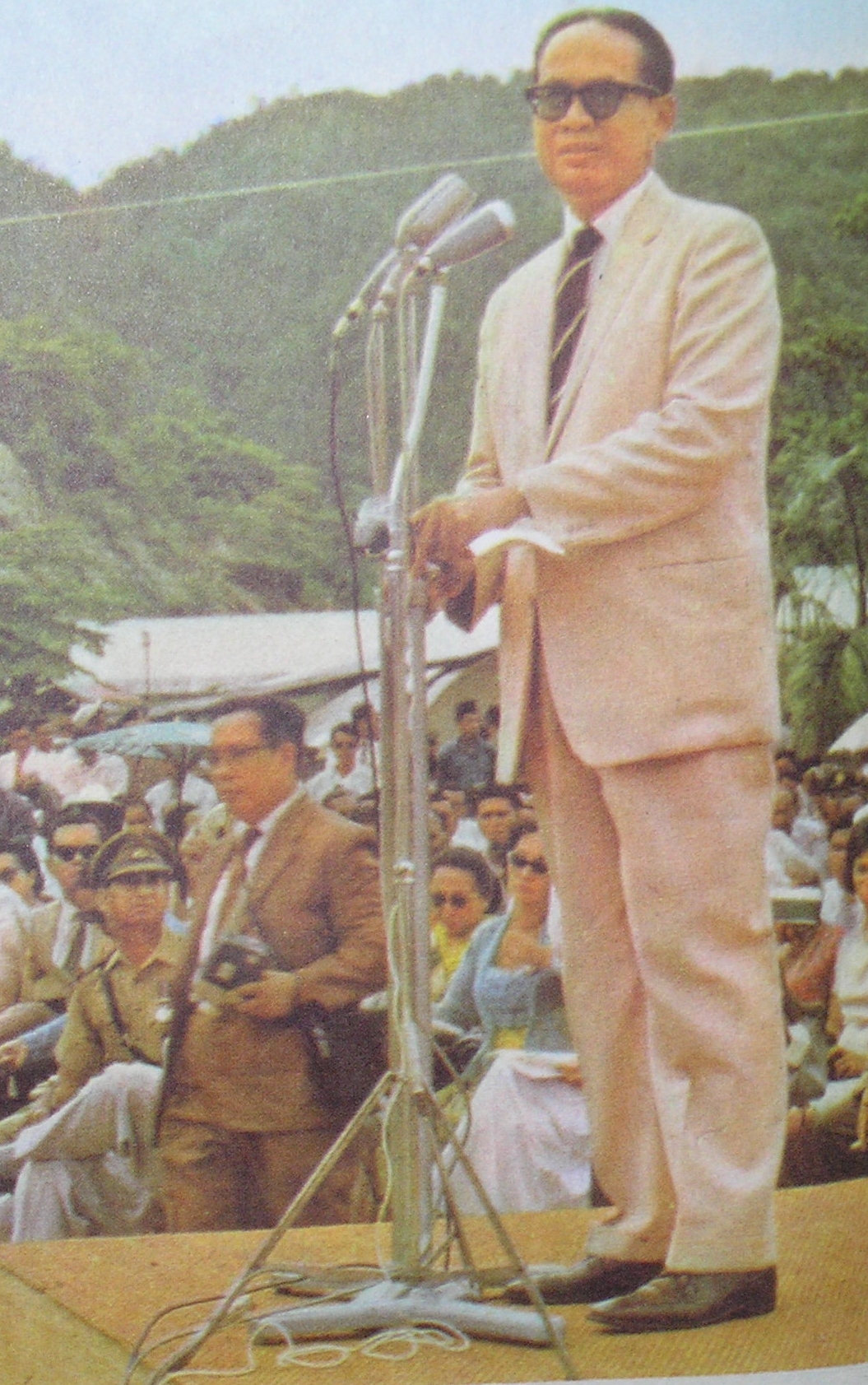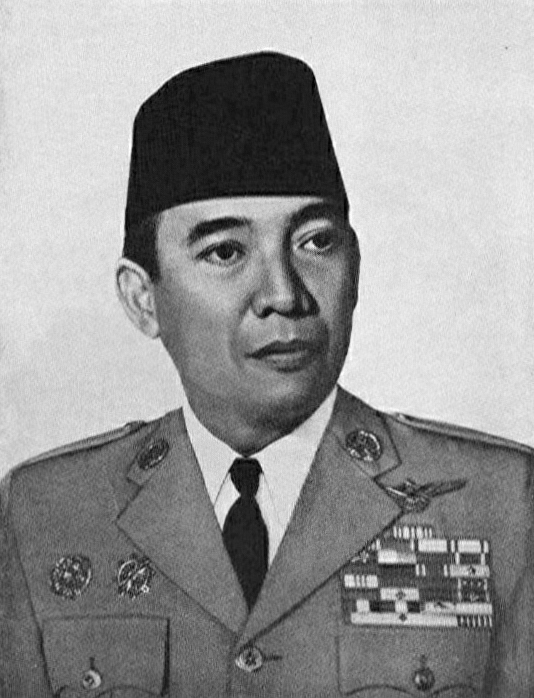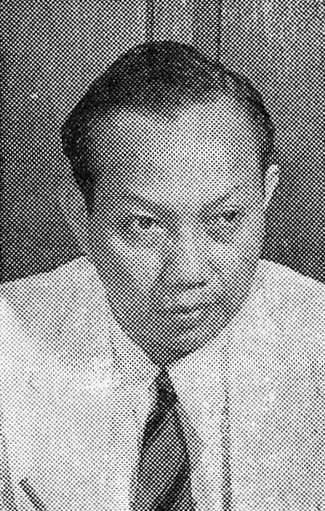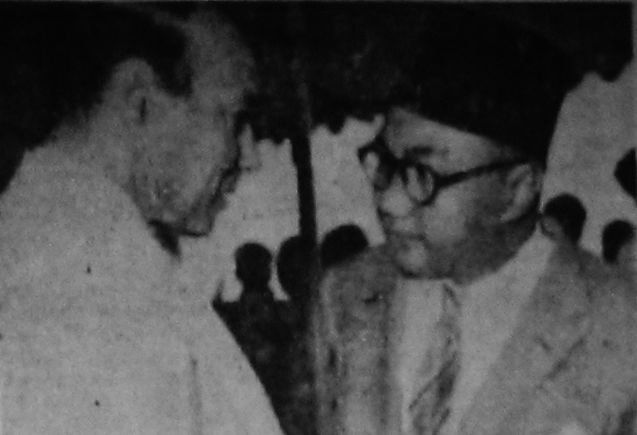|
Subandrio
Subandrio (15 September 1914 – 3 July 2004) was an Indonesian politician and Foreign Minister and First Deputy Prime Minister of Indonesia under President Sukarno. Removed from office following the failed 1965 coup, he spent 29 years in prison. The spelling "Subandrio" has been official in Indonesia since 1947 but the older spelling Soebandrio is still sometimes used. Early career Subandrio was born in Malang, East Java, and educated at the Sekolah Tinggi Kedokteran Jakarta (GHS) in Jakarta. As a medical student he was active in the movement for independence. During World War II, while practicing medicine, he worked with anti-Japanese resistance forces. His wife, Hurustiati Subandrio, was also a politically active medical doctor. After the war he was appointed secretary-general of the information ministry. After 1945 Subandrio became a supporter of the nationalist leader Sukarno, and was sent as Sukarno's special envoy in Europe, establishing an information office in Lo ... [...More Info...] [...Related Items...] OR: [Wikipedia] [Google] [Baidu] |
Hurustiati Subandrio
Hurustiati Subandrio (–1974), in Van Ophuijsen Spelling Hoeroestiati Soebandrio, was an Indonesian physician, politician, anthropologist and social activist. She held a number of high-profile roles during the Sukarno era, including being head of Public Health education for the Ministry of Health, president of the Indonesian Women's Congress, and vice-chair of the World Health Organization. She was the wife of Subandrio, a close ally of Sukarno who was Indonesian Minister of Foreign Affairs (1956–1966) and later a political prisoner (1966–1995). Biography Hurustiati was born in around 1918 in Lawang, East Java, Dutch East Indies, not far from the city of Malang. She was of an elite Javanese background; she was the daughter of the Regent of Pasururan. She studied in a Dutch-language Hogere Burgerschool in Malang, and later described herself as withdrawn and interested in poetry during that time. She graduated in 1936. She started a medical degree in Jakarta (then call ... [...More Info...] [...Related Items...] OR: [Wikipedia] [Google] [Baidu] |
Subandrio 1963
Subandrio (15 September 1914 – 3 July 2004) was an Indonesian politician and Foreign Minister and First Deputy Prime Minister of Indonesia under President Sukarno. Removed from office following the failed 1965 coup, he spent 29 years in prison. The spelling "Subandrio" has been official in Indonesia since 1947 but the older spelling Soebandrio is still sometimes used. Early career Subandrio was born in Malang, East Java, and educated at the Sekolah Tinggi Kedokteran Jakarta (GHS) in Jakarta. As a medical student he was active in the movement for independence. During World War II, while practicing medicine, he worked with anti-Japanese resistance forces. His wife, Hurustiati Subandrio, was also a politically active medical doctor. After the war he was appointed secretary-general of the information ministry. After 1945 Subandrio became a supporter of the nationalist leader Sukarno, and was sent as Sukarno's special envoy in Europe, establishing an information office in Lo ... [...More Info...] [...Related Items...] OR: [Wikipedia] [Google] [Baidu] |
Sunda Straits Crisis
The Sunda Straits Crisis was a two-week confrontation between the United Kingdom and Indonesia over the passage of the Illustrious-class aircraft carrier HMS ''Victorious'' through the Sunda Strait, a major waterway separating the Indonesian islands of Java and Sumatra, occurring between August and September 1964. The incident was part of the larger Indonesia-Malaysia confrontation, an armed conflict between Indonesia and Malaysia (with the military support of Britain) over the formation of the latter as an independent state. On 27 August 1964, the British aircraft carrier HMS ''Victorious'' and her two destroyer escorts sailed through the Sunda Strait, an international waterway claimed by Indonesia, en route to Australia. Upset by the casual warning the British had given of the ships' impending passage through the Strait (a telephone call made two days before, which did not mention the carrier) and wary of the possibility that the British were attempting to provoke a viol ... [...More Info...] [...Related Items...] OR: [Wikipedia] [Google] [Baidu] |
Titular And Honorary Rank
In the Indonesian military, titular and honorary ranks are two different types of special military ranks. Unlike the normal rank in the Indonesian military, titular and honorary ranks could be given to civilians who served temporarily in the military or contributed to the military. Titular rank Background Titular rank have been given since the Indonesian National Revolution. During the revolution, the office of governors, residents, and regents were transformed into military offices, which allowed them to regulate military affairs in their region. In their capacity, they were given titular military ranks. Military governors were given the titular rank of general major, military residents were given the titular rank of lieutenant colonel, and military regents were given the titular rank of major. Several military offices during the revolution also involve civilian officeholders. An example of this is the Army Political Education Staff and the Military Court. The Army Political Ed ... [...More Info...] [...Related Items...] OR: [Wikipedia] [Google] [Baidu] |
Sukarno
Sukarno). (; born Koesno Sosrodihardjo, ; 6 June 1901 – 21 June 1970) was an Indonesian statesman, orator, revolutionary, and nationalist who was the first president of Indonesia, serving from 1945 to 1967. Sukarno was the leader of the Indonesian struggle for independence from the Dutch colonialists. He was a prominent leader of Indonesia's nationalist movement during the colonial period and spent over a decade under Dutch detention until released by the invading Japanese forces in World War II. Sukarno and his fellow nationalists collaborated to garner support for the Japanese war effort from the population, in exchange for Japanese aid in spreading nationalist ideas. Upon Japanese surrender, Sukarno and Mohammad Hatta declared Indonesian independence on 17 August 1945, and Sukarno was appointed president. He led the Indonesian resistance to Dutch re-colonisation efforts via diplomatic and military means until the Dutch recognition of Indonesian independence ... [...More Info...] [...Related Items...] OR: [Wikipedia] [Google] [Baidu] |
Ministry Of Foreign Affairs (Indonesia)
The Ministry of Foreign Affairs (, abbreviated as ''Kemlu'') or commonly known by its abbreviations as, is an Indonesian government ministry responsible for the country's foreign politics and diplomacy. The ministry was formerly known as the Department of Foreign Affairs (, abbreviated as ''Deplu'') until 2008 when the nomenclature changed with the enactment of the 2008 State Ministry Act (). Ministry of Foreign Affairs is one of three ministries, along with Ministry of Defense and Ministry Home Affairs, that is explicitly mentioned in the Constitution of Indonesia, hence the president has no authority to dissolve the ministry. According to Article 8 of the Constitution, in case that both the president and the vice president can no longer serve at the same time, the line of succession temporarily falls to a ''troika'' of minister of foreign affairs, minister of home affairs, and minister of defense who would govern concurrently until the succeeding President and Vice Preside ... [...More Info...] [...Related Items...] OR: [Wikipedia] [Google] [Baidu] |
Adam Malik
Adam Malik Batubara (22 July 1917 – 5 September 1984), or more commonly referred to simply as Adam Malik, was an Indonesians, Indonesian politician, diplomat, and journalist, who served as the 3rd Vice President of Indonesia from 1978 until 1983, under President Suharto. Previously, he served in a number of diplomatic and governmental positions, including List of speakers of the People's Consultative Assembly, Speaker of the People's Consultative Assembly from 1977 to 1978, Speakers of the People's Representative Council, Speaker of the People's Representative Council from 1977 to 1978, Ministry of Foreign Affairs (Indonesia)#List of foreign ministers, Foreign Minister of Indonesia from 1966 until 1977, and president of the United Nations General Assembly from 1971 until 1972. Born in Pematangsiantar, North Sumatra, on 22 July 1917. He grew up relatively comfortably, and was educated at the Hollandsch-Inlandsche School (HIS). He pioneered the establishment of the Antara (ne ... [...More Info...] [...Related Items...] OR: [Wikipedia] [Google] [Baidu] |
Soepomo
Soepomo ( EYD: Supomo; 22 January 1903 – 12 September 1958) was an Indonesian politician and lawyer who served as the country's first Minister of Justice from August until November 1945 and again from December 1949 until 6 September 1950. Known as the father of Indonesia's constitution, he was posthumously declared an Indonesian National Hero by President Sukarno in 1965. Early life and education Soepomo was born on 22 January 1903, in Sukoharjo, Dutch East Indies (now Indonesia). He came from a noble family; his maternal and paternal grandfathers were both high-ranking government officials. He began his education in 1917, when he was enrolled at a '' Europeesche Lagere School'' (ELS) in Boyolali. He graduated in 1920, and continued his studies to a ''Meer Uitgebreid Lager Onderwijs'' (MULO) in Surakarta. In 1923, he moved to Batavia (now Jakarta) and attended the '' Rechts Hogeschool'' (RHS). After graduating from RHS, he took a job at a court in Surakarta, before le ... [...More Info...] [...Related Items...] OR: [Wikipedia] [Google] [Baidu] |
Ruslan Abdulgani
Ruslan Abdulgani (November 24, 1914, Surabaya — June 29, 2005, Jakarta, his first name is also spelled Roeslan) was an Indonesian government official and diplomat known for his role as a leader during the Indonesian National Revolution in the late 1940s, and as a key minister and United Nations ambassador in the Sukarno government during the 1950s and 1960s. Roeslan was born and raised in Surabaya, East Java. He came from an upper-middle-class family; his father was a neighborhood shopkeeper and owned a small fleet of taxis. His mother, his father's second wife, was a religious tutor, giving reading and religion lessons from the Qur'an. According to a memoir of his childhood, which Roeslan wrote in the 1970s, his mother was also a strong Javanese nationalist, and it was from her that he first learned about Dutch colonial rule and the possibility of independence. During the Indonesian fight for independence from the Dutch in the late 1940s, Roeslan was a key lieutenant u ... [...More Info...] [...Related Items...] OR: [Wikipedia] [Google] [Baidu] |
Dutch East Indies
The Dutch East Indies, also known as the Netherlands East Indies ( nl, Nederlands(ch)-Indië; ), was a Dutch colony consisting of what is now Indonesia. It was formed from the nationalised trading posts of the Dutch East India Company, which came under the administration of the Dutch government in 1800. During the 19th century, the Dutch possessions and hegemony expanded, reaching the greatest territorial extent in the early 20th century. The Dutch East Indies was one of the most valuable colonies under European rule, and contributed to Dutch global prominence in spice and cash crop trade in the 19th to early 20th centuries. The colonial social order was based on rigid racial and social structures with a Dutch elite living separate from but linked to their native subjects. The term ''Indonesia'' came into use for the geographical location after 1880. In the early 20th century, local intellectuals began developing the concept of Indonesia as a nation state, and set the stage ... [...More Info...] [...Related Items...] OR: [Wikipedia] [Google] [Baidu] |
Japanese Occupation Of Indonesia
The Empire of Japan occupied the Dutch East Indies (now Indonesia) during World War II from March 1942 until after the end of the war in September 1945. It was one of the most crucial and important periods in modern Indonesian history. In May 1940, Germany occupied the Netherlands, and martial law was declared in the Dutch East Indies. Following the failure of negotiations between the Dutch authorities and the Japanese, Japanese assets in the archipelago were frozen. The Dutch declared war on Japan following the 7 December 1941 Attack on Pearl Harbor. The Japanese invasion of the Dutch East Indies began on 10 January 1942, and the Imperial Japanese Army overran the entire colony in less than three months. The Dutch surrendered on 8 March. Initially, most Indonesians welcomed the Japanese as liberators from their Dutch colonial masters. The sentiment changed, however, as between 4 and 10 million Indonesians were recruited as forced labourers ('' romusha'') on economic dev ... [...More Info...] [...Related Items...] OR: [Wikipedia] [Google] [Baidu] |
United Kingdom
The United Kingdom of Great Britain and Northern Ireland, commonly known as the United Kingdom (UK) or Britain, is a country in Europe, off the north-western coast of the continental mainland. It comprises England, Scotland, Wales and Northern Ireland. The United Kingdom includes the island of Great Britain, the north-eastern part of the island of Ireland, and many smaller islands within the British Isles. Northern Ireland shares a land border with the Republic of Ireland; otherwise, the United Kingdom is surrounded by the Atlantic Ocean, the North Sea, the English Channel, the Celtic Sea and the Irish Sea. The total area of the United Kingdom is , with an estimated 2020 population of more than 67 million people. The United Kingdom has evolved from a series of annexations, unions and separations of constituent countries over several hundred years. The Treaty of Union between the Kingdom of England (which included Wales, annexed in 1542) and the Kingdom of Scotland in 170 ... [...More Info...] [...Related Items...] OR: [Wikipedia] [Google] [Baidu] |


_Subandrio.jpg)




